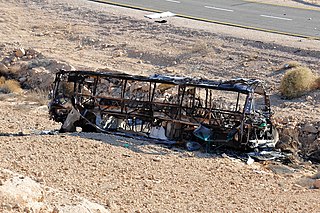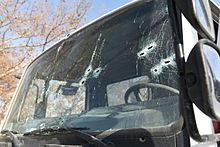
East Talpiot or Armon HaNetziv is an Israeli settlement in southern East Jerusalem, established by Israel in 1973 on land captured in the Six-Day War and occupied since then. The international community considers East Talpiot to be an Israeli settlement that is illegal under international law. With a population of over 15,000 Israeli settlers, East Talpiot is one of Jerusalem's Ring Neighborhoods.

On July 2, 2008, an Arab resident of East Jerusalem identified as Hussam Taysir Duwait attacked several cars on Jaffa Road in Jerusalem in a vehicle-ramming attack using a front-end loader, killing three civilians and wounding at least thirty other pedestrians, before being shot to death. Israeli government spokesman Mark Regev said that an inquiry indicated the attacker had been acting alone. A motive for the attack could not immediately be determined, but police at the scene referred to the incident as a terrorist attack. Three copycat attacks have occurred since then.

Jabel Mukaber is a predominantly Palestinian neighborhood in southern East Jerusalem. It is bordered by East Talpiot to the west, Abu Tor and Silwan to the north and Sur Baher to the south. Jabel Mukaber has a population of approximately 30,000 (2017).

The Itamar attack, also called the Itamar massacre, was a terrorist attack on an Israeli family in the Israeli settlement of Itamar in the West Bank that took place on 11 March 2011, in which five members of the same family were murdered in their beds. The victims were the father Ehud (Udi) Fogel, the mother Ruth Fogel, and three of their six children—Yoav, 11, Elad, 4, and Hadas, the youngest, a three-month-old infant. The infant was decapitated. The settlement of Itamar had been the target of several murderous attacks before these killings.

On August 18, 2011, a series of cross-border attacks with parallel attacks and mutual cover was carried out in southern Israel on Highway 12 near the Egyptian border by a squad of presumably twelve militants in four groups. The attacks occurred after Israel's interior security service Shin Bet had warned of an attack by militants in the region and Israeli troops had been stationed in the area. The militants first opened fire at an Egged No. 392 bus as it was traveling on Highway 12 in the Negev near Eilat. Several minutes later, a bomb was detonated next to an Israeli army patrol along Israel's border with Egypt. In a third attack, an anti-tank missile hit a private vehicle, killing four civilians. Eight Israelis – six civilians, one Yamam special unit police sniper and one Golani Brigade soldier—were killed in the multiple-stage attack. The Israel Defense Forces reported eight attackers killed, and Egyptian security forces reported killing another two.
The 2011 Tel Aviv nightclub attack was a combined vehicular assault and stabbing attack which occurred on 29 August 2011 when a Palestinian attacker stole an Israeli taxi cab and rammed it into a police checkpoint guarding the popular nightclub, Haoman 17, in Tel Aviv which was filled with 2,000 Israeli teenagers. After crashing into the checkpoint, the attacker jumped out of the vehicle and began stabbing people. Four civilians, four police officers, and the assailant were injured in the attack. The assailant was living illegally in Israel at the time of the attack.
The August 2012 Sinai attack occurred on 5 August 2012, when armed men ambushed an Egyptian military base in the Sinai Peninsula, killing 16 soldiers and stealing two armored cars, which they used to infiltrate into Israel. The attackers broke through the Kerem Shalom border crossing to Israel, where one of the vehicles exploded. They then engaged in a firefight with soldiers of the Israel Defense Forces (IDF), during which six of the attackers were killed. No Israelis were injured.
A terrorist ramming attack occurred on 4 August 2014 in Jerusalem, when a Palestinian drove an excavator out of a construction site, injuring several pedestrians and killing a civilian before ramming the tractor into a public bus, overturning the bus and then hitting it repeatedly. The terrorist was shot dead at the scene by two police officers while still seated at the wheel of the tractor and continuing to attack the bus by swinging the arm of the excavator against it.
Sergeant Almog Shiloni of the Israel Defense Forces was killed on 10 November 2014 after he was stabbed multiple times at Tel Aviv HaHagana Railway Station. He died in hospital from his wounds. Shiloni was off-duty, but in uniform and armed at the time.

An increase of violence occurred in the Israeli–Palestinian conflict starting in the autumn of 2015 and lasting into the first half of 2016. It was called the "Intifada of the Individuals" by Israeli sources, the Knife Intifada, Stabbing Intifada or Jerusalem Intifada by international sources because of the many stabbings in Jerusalem, or Habba by Palestinian sources. 38 Israelis and 235 Palestinians were killed in the violence. 558 Israelis and thousands of Palestinians were injured.

In a terrorist attack in Tel Aviv, Israel on 8 June 2016, two Palestinian gunmen opened fire on patrons at the Max Brenner Cafe at the Sarona Market, killing four people and injuring seven others. The perpetrators were caught alive by the security forces and put in custody. According to an official indictment filed by the Tel Aviv District Prosecutor's Office the perpetrators were inspired by the Islamic State group.
On 16 June 2017, two Palestinian men opened fire on Israeli police officers in the Old City of Jerusalem, injuring four of them. An additional attacker stabbed a policewoman, she was critically injured, and later died in hospital. All three attackers were shot and killed by the Israeli authorities.
On 14 July 2017, three Arab-Israeli men left the Temple Mount, and opened fire on Israeli border police officers stationed near the Gate of the Tribes which is close to the Lions' Gate. Two Israeli border police officers were killed and two more were injured in the attack. All three attackers were shot and killed by Israeli police after fleeing back into the complex.
The Halamish attack, or the Halamish massacre was a terrorist attack on a Jewish family in the West Bank Israeli settlement of Halamish, that took place on 21 July 2017, in which three Israelis were stabbed to death and one severely wounded. The victims of the attack were Yosef Salomon, his daughter Chaya and son Elad, the three who were murdered in the attack, and Tova Salomon, Yosef's wife, who was injured but survived.
On 2 August 2017, a 19-year old Palestinian teen critically injured an Israeli civilian with a knife at a local supermarket in the city of Yavne, located in the Central District of Israel. The attacker was subsequently arrested after being captured by civilians who were at the spot. Police confirmed the attack was an act of terrorism.

On the morning of 26 September 2017, a Palestinian gunman opened fire at Israeli security guards at the entrance gate of Har Adar, an Israeli settlement and affluent residential border community of Jerusalem located largely on the other side of the green line within the West Bank. Three Israeli security guards were killed and one was injured. The gunman was shot dead by the remaining guards. The Israeli authorities described the attack as an 'act of terrorism'.
On 13 October 2015, two Palestinians, armed with a firearm and a knife boarded a bus in the Israeli settlement of East Talpiot in East Jerusalem, and started attacking and stabbing the passengers. One of the assailants tried to take control on the bus and locked the bus door to prevent the passengers from escaping. Police arrived, killed one of the assailants and neutralized the other. Three civilians were killed and 15 wounded. One of the wounded succumbed to his wounds on 27 October 2015.

On 10 February 2023, three Israelis were killed and four more were injured when a Palestinian man rammed his car into a bus stop in Ramot, an Israeli settlement in East Jerusalem. The assailant was shot dead at the scene by a police officer. The fatalities included two children aged 6 and 8 and a 20-year-old man. Police labeled the attack as an act of terrorism.
On the morning of September 8, 2024, a Jordanian truck driver carried out a shooting attack at the Allenby Bridge, a border terminal between Jordan and the Israeli-occupied West Bank, killing three Israeli civilians.











